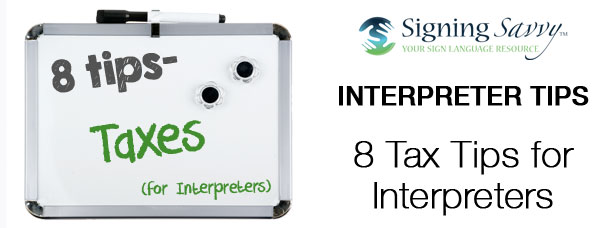
Interpreter 4-1-1: Tax Tips for Interpreters
Interpreters often do a lot of freelance / independent contractor work, and receive a Form 1099 at the end of the year to report their compensation. When you are self-employed and do independent contractor work, there are several tax deductions that you can take advantage of.
Hopefully you have already been preparing yourself and organizing your taxes. Just in case you need it, here are some helpful hints:
- Take time to organize your information and all supporting documentation. Your estimated self-employment tax payments should be at least the same amount as in the previous years.
- The compensation received and reported on Form 1099 is reported on Schedule C, which is filed with your individual tax return. As a self-employed individual, you are eligible for business related expenses including advertising, office expenses, travel, and meals and entertainment. In most cases meals are limited to 50% of your incurred expense. Note: Make sure you save the receipt and write down with whom you were discussing business.
- For business related local transportation or overnight travel by car you can generally deduct either A) actual expenses or B) the standard mileage rate. Note: The 2014 standard mileage rate is $0.56 per business mile.
- Expenses for health insurance premiums may be 100% deductible. Self-employed individuals that are eligible for group insurance through their or their spouse’s employer are not eligible. Find out more about the Self-Employed Health Insurance Deduction.
- CEU workshops and travel expenses may be deducted.
- Expenses related to a home office are deductible if you use a space in your home exclusively and regularly for administrative and management activities of your trade or business and you have no other fixed location where you conduct substantial administrative or management activities of the trade or business. Find out more about the Home Office Deduction.
- Office supplies, postage, dues and subscriptions are deductible.
- Keep your receipts! Keep your receipts for all deductions for 7 years. It helps to clearly label your receipts with the type of deduction and what business project / client it was accrued for.
Tax rules change and can vary depending on your specific situation. It is always wise to check with a Certified Public Accountant to see how what deductions are applicable to your tax situation.
ADVERTISEMENTS
 Brenda Cartwright is a Coda, seasoned interpreter, a master teacher, well known presenter, and author of several best selling sign language and interpreting textbooks from the RID Press. For 35 years Brenda was the Chair of the Sign Language Interpreter Program at Lansing Community College in Lansing, Michigan.
Brenda Cartwright is a Coda, seasoned interpreter, a master teacher, well known presenter, and author of several best selling sign language and interpreting textbooks from the RID Press. For 35 years Brenda was the Chair of the Sign Language Interpreter Program at Lansing Community College in Lansing, Michigan. Interpreter Q & A: When Interpreters Omit Information
Interpreter Q & A: When Interpreters Omit Information Interpreter 4-1-1: 5 Steps for Resolving Interpreter Conflicts
Interpreter 4-1-1: 5 Steps for Resolving Interpreter Conflicts Interpreter 4-1-1: Ways Interpreters Can Stay Passionate
Interpreter 4-1-1: Ways Interpreters Can Stay Passionate






